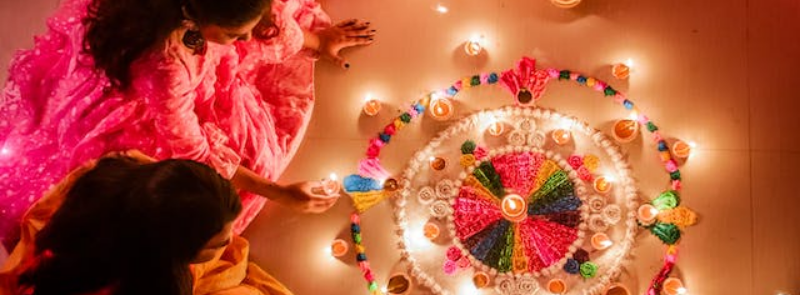
When It Occurs
Annually Hindu Lunisolar Month of Ashvin
Official Website
Timeline
Days Passed (478)
# Hashtags
#Diwali #LightADiya
Diwali, a Hindu festival of lights, celebrates the triumph of good over evil. The name originates from the Sanskrit word "deepavali," meaning "row of lights." Typically occurring on the day of "Amavasyaa" or the no-moon day, in either October or November, Diwali is a significant religious observance in Hinduism, Jainism, and Sikhism. The festival's traditions vary across regions and religions, yet the underlying myths and historical stories consistently revolve around themes of justice and liberation.
Diwali stands as India's largest and most significant holiday of the year. The festival derives its name from the row (avali) of clay lamps (deepa) that Indians illuminate outside their homes, symbolizing the inner light that guards against spiritual darkness.
Origins and Significance
The word "Diwali" is derived from the Sanskrit term "Deepavali," meaning "a row of lights." Diwali's significance varies across different regions and religions:
-
Hinduism: Diwali marks the return of Lord Rama, his wife Sita, and brother Lakshmana to Ayodhya after 14 years of exile, following his victory over the demon king Ravana. People celebrate by lighting oil lamps (diyas) to welcome them and symbolize the triumph of good over evil.
-
Jainism: Diwali commemorates the nirvana (spiritual liberation) of Lord Mahavira, the 24th Tirthankara, who attained moksha (freedom from the cycle of life and death) on this day in 527 BCE.
-
Sikhism: For Sikhs, Diwali is linked to the release of Guru Hargobind Ji from imprisonment in 1619, along with 52 Hindu kings. The festival celebrates freedom and justice.
-
Buddhism: Some Buddhists, particularly those following the Newar community in Nepal, celebrate Diwali in honor of Emperor Ashoka's conversion to Buddhism.
The Five Days of Diwali
Diwali celebrations typically last five days, with each day having its own religious significance:
-
Dhanteras (Day 1): This day is dedicated to wealth and prosperity. People clean their homes and buy new items, especially gold or utensils, to bring good fortune. It honors Dhanvantari, the god of health and healing.
-
Naraka Chaturdashi / Choti Diwali (Day 2): On this day, people commemorate Lord Krishna's victory over the demon Narakasura. It is a day for early morning rituals and preparation for the main Diwali day.
-
Lakshmi Puja (Day 3 - Main Diwali Day): The third day is the most important. People worship Goddess Lakshmi, the goddess of wealth and prosperity, along with Lord Ganesha for wisdom and good fortune. Homes are decorated with oil lamps, rangoli (patterns made with colored powders), and lights. Fireworks are burst to celebrate the occasion.
-
Govardhan Puja / Annakut (Day 4): This day celebrates Lord Krishna lifting Mount Govardhan to protect villagers from torrential rains. In some regions, large feasts are prepared, and offerings are made to the deities.
-
Bhai Dooj (Day 5): This day honors the bond between brothers and sisters. Sisters perform rituals for their brothers' well-being, and brothers give gifts to their sisters in return for protection and blessings.
Customs and Traditions
-
Lighting Diyas and Firecrackers: Homes are illuminated with earthen oil lamps (diyas) and electric lights to ward off darkness and evil spirits. Firecrackers are also set off to celebrate the victory of light over darkness.
-
Rangoli: Intricate patterns made with colored powders, flowers, or rice are drawn at the entrances of homes to welcome guests and deities. Rangoli is a traditional form of Indian art and symbolizes joy and positivity.
-
Sweets and Feasting: Diwali is synonymous with sharing sweets and snacks. Families prepare or buy sweets like ladoo, barfi, and gulab jamun, and share them with neighbors, friends, and relatives.
-
Gambling: It is considered auspicious to play games of chance, such as cards or dice, during Diwali, as it is believed to bring prosperity for the upcoming year.
-
Cleaning and Decorating Homes: In preparation for Diwali, people thoroughly clean and renovate their homes. The idea is to invite Goddess Lakshmi into a neat and beautiful space, ensuring good fortune.
-
Exchange of Gifts: Friends and family exchange gifts, including sweets, clothes, jewelry, and other tokens of appreciation.
Regional Variations
Diwali customs vary across India's diverse regions:
-
North India: The story of Lord Rama’s return from exile dominates Diwali celebrations, and people light up their homes with oil lamps to celebrate.
-
West India (Maharashtra, Gujarat): In Gujarat, Diwali coincides with the Gujarati New Year. People worship Goddess Lakshmi and Lord Ganesha, and the focus is on wealth and business prosperity.
-
South India: In Tamil Nadu and Karnataka, Diwali is celebrated to honor Lord Krishna's defeat of Narakasura. In Kerala, Diwali is a less prominent festival compared to other southern states.
-
East India (Bengal, Odisha): In West Bengal, Diwali is celebrated as Kali Puja, with devotees worshiping Goddess Kali, who represents strength and the destruction of evil. In Odisha, people remember their ancestors by lighting diyas and lanterns on Diwali night.
Diwali and the Economy
Diwali is a critical time for the Indian economy, often compared to the holiday shopping season in Western countries. Businesses launch promotions, discounts, and sales. The festival boosts the sales of items such as gold, jewelry, clothing, electronics, and automobiles. For many industries, Diwali is the busiest and most lucrative period of the year.
Environmental Concerns
In recent years, concerns about pollution from fireworks have led to more eco-friendly celebrations. Many people are switching to "green" crackers or forgoing fireworks entirely. Additionally, using biodegradable materials for rangoli and decorations is becoming more popular to reduce environmental impact.
Conclusion
Diwali is a festival that unites people through its universal themes of light, joy, and community. While deeply rooted in religious traditions, it has evolved to become a celebration of family, prosperity, and togetherness. The beauty of Diwali lies in its adaptability, with each region and community adding its unique customs while maintaining the festival’s core spirit.


